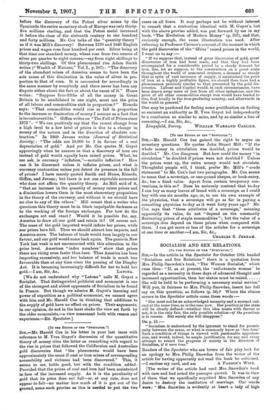LTO TEN EDITOR OP THE . SPROTATON."1
Sra,—Mr. Harold Cox in his letter in your last issue with reference to M. Yves Guyot's discussion of the quantitative theory of money cites the latter as remarking with regard to the rise in prices that followed the Californian and Australian gold discoveries that " the phenomena would have been approximately the same if coal or iron mines of corresponding accessibility and richness had been discovered?' This, it seems to me, holds good, but with the condition added : Provided that the prices of coal and iron had been maintained in face of the increased supply. As it is the peculiarity of gold that its price does not fall—or, at any rate, does not appear to fall—no matter how much of it is got out of the ground, some such proviso as this is needed to put the two cases on all fours. It may perhaps not be without interest to remark that a contention identical with M. Guyot's, but with the above proviso added, was put forward by me in my book, "The Evolution of Modern Money" (p. 307), and that, curiously enough, the same illustration was used. After referring to Professor Cairnes's account of the manner in which the gold discoveries of the " fifties" raised prices in the world, I went on to say:—
" If we suppose that, instead of great discoveries of gold, great discoveries of iron had been made, and that they had been accompanied for a considerable period by a steady demand for iron, due, let us suppose, to the construction on a great scale throughout the world of armoured cruisers, a demand so steady that in spite of vast increases of supply, it maintained the price of iron at a highly profitable figure, we should then have bad a phenomenon precisely similar to that presented by the gold dis- coveries. Labour and Capital would, in such circumstances, have been drawn away more or less from all other industries, and the price of all other commodities except iron would have tended to rise, first locally in the iron-producing country, and afterwards in the world in general."
One may be pardoned for feeling some gratification on finding so eminent an authority as M. Yves Guyot led independently to a conclusion so similar to mine, and by so similar a line of reasoning.—I am, Sir, &c.,
Limpsfield, Surrey. WI:GLUM WAREAND CARLILE.






























































 Previous page
Previous page